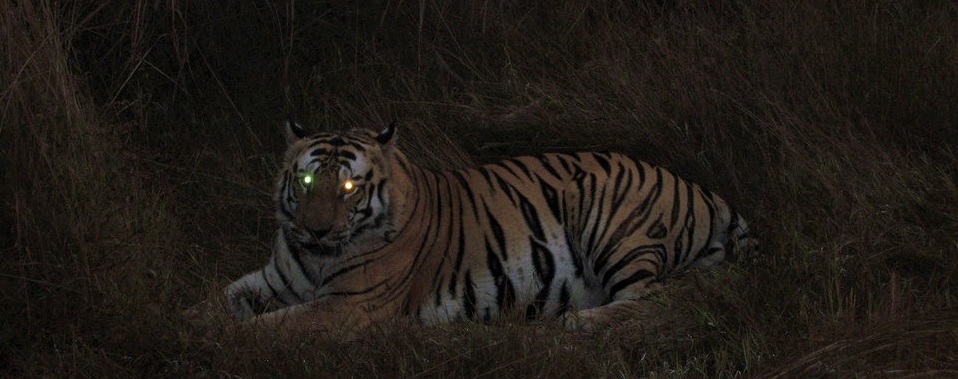In Madhya Pradesh's Pench National Park, widely recognized as the inspiration behind "The Jungle Book’s" Mowgli. Nestled across the Seoni and Chhindwara districts of Madhya Pradesh, is a celebrated wildlife sanctuary known for its rich biodiversity and captivating landscapes. It forms part of the larger Pench Tiger Reserve, which also includes buffer zones teeming with diverse flora and fauna. Named after the Pench River that flows through its expanse, the park is particularly famous for being the setting of Rudyard Kipling's incredible novel. Dense forests of teak, mahua, and bamboo line its undulating terrain, creating a habitat that supports not only tigers but also leopards, wild dogs, sloth bears, and numerous species of birds and reptiles. In recent years, Pench has gained attention for its thriving tiger population, making it a key destination for wildlife enthusiasts, conservationists, and tourists. The park's unique mix of lush forests, open grasslands, and tranquil water bodies provides a fantastic experience, offering a glimpse into the delicate balance of India’s natural ecosystems and the efforts underway to preserve its iconic wildlife.
Read on to Know Why the Night Bagh Chaupals are Arranged
The core area of Pench National Park is in the central part of the tiger reserve, predominantly covered with dense forest. However, in the bugger area, that surrounds the core zones, few villages are settled with human habitations. These areas often encounter wild animals and the dwellers often find themselves being preyed by tigers. Not only the buffer areas of Pench, but the adjoining regions of the national park also face the same problem.
To protect the human beings surviving in these areas, the Pench Tiger Reserve management body has initiated night meetings known as ‘Bagh Chaupals’ to raise awareness about tiger-human conflicts. These sessions aim to educate villagers on preventing fatal encounters with tigers and are held across more than 100 villages in the reserve’s buffer zone and surrounding areas in Seoni and Chhindwara districts.
Beginning on October 16, 2024, each Bagh Chaupal lasts about an hour and includes the screening of documentaries and short films on large screens. Interactive presentations further inform villagers - particularly women and children - about the role of tigers in the ecosystem, the significance of forest and wildlife preservation, the reasons behind tiger attacks on livestock and people, and guidelines for staying safe when encountering a tiger. An additional focus is on teaching villagers how to protect themselves from snakes in the forest.
A unique feature of these chaupals is the involvement of local leaders, especially tribal representatives, who avoid political discussions and focus solely on wildlife and forest conservation. The first phase of the Bagh Chaupals has concluded, with the second phase scheduled to begin on December 1, 2024. There are plans to make these evening gatherings a permanent part of community engagement efforts.
The Pench Tiger Reserve and its surrounding landscapes in South Seoni, South Balaghat, and South and East Chhindwara host approximately 123 tigers, with 80-85 residing within the reserve itself, while the rest move between the park and adjacent areas. The 2018 tiger census reported 87 tigers in the area, a number that has since increased to 123 by 2022, highlighting the growing tiger population in the region.

